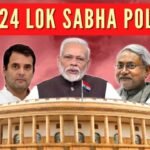In a significant development on Friday, over a dozen opposition parties joined forces against the Bharatiya Janata Party (BJP). In response, the ruling party referred to the alliance as a “multi-headed selfish alliance” and likened it to wolves hunting in packs.
Following the opposition unity meeting in Patna, Bihar, Union Minister and BJP leader Smriti Irani held a press conference to address the matter. Irani emphasized that the coming together of these parties was not aimed solely at Prime Minister Narendra Modi but rather targeted the nation’s resources.
During the press conference, Irani remarked, “It is said that wolves hunt in packs! A political pack met in Patna. Their ‘prey’ is the future of India.” Her statement conveyed the BJP’s concerns about the intentions behind the opposition alliance.
The opposition parties’ decision to unite against the ruling party marks a significant political development. Such alliances often aim to consolidate strength and challenge the ruling party’s dominance. The BJP, as the incumbent party, is now facing a united front that seeks to collectively address what they perceive as issues affecting the country.
The BJP’s characterization of the opposition alliance as a “multi-headed selfish alliance” implies that the parties involved have their own individual interests at heart, rather than the welfare of the nation. The ruling party’s comparison to wolves hunting in packs is meant to portray the opposition’s actions as predatory and driven by self-serving motives.
It is worth noting that opposition alliances are not uncommon in democratic systems, particularly during election periods. Parties with similar ideologies or shared concerns often come together to present a united front and challenge the ruling party’s policies and leadership. The BJP’s reaction to this alliance reflects their awareness of the potential threat posed by a unified opposition.
While the BJP criticizes the opposition’s motives, the participating parties argue that their unity is motivated by a desire to address pressing issues facing the country. They believe that the ruling party’s policies and actions have not been conducive to the overall well-being of India and its citizens. By forming an alliance, they aim to present an alternative vision and policies to the electorate.
The opposition parties’ unity meeting in Patna indicates that they are willing to set aside their differences and work together towards a common goal. This collaboration strengthens their collective bargaining power and increases their chances of challenging the ruling party in upcoming elections.
The BJP’s response to the opposition alliance suggests that they view this united front as a potential threat to their hold on power. The ruling party’s concern over the nation’s coffers reflects their fear that the opposition’s policies, if implemented, could have an impact on the country’s economy and financial resources.
Political analysts and observers will closely monitor the developments following this opposition unity meeting. The unity of multiple parties against the BJP signifies a shifting political landscape and the potential for a more competitive electoral environment. The success of this alliance will depend on the ability of the participating parties to overcome internal differences, rally their respective support bases, and effectively communicate their alternative vision to the electorate.
As the political landscape evolves, it is essential for both the ruling party and the opposition alliance to engage in constructive dialogue and debate. The interests of the nation and its citizens should remain at the forefront, ensuring that policies and decisions are made with the welfare of the country in mind. The upcoming elections will be a critical test for both the BJP and the united opposition, and the electorate will ultimately determine the direction India takes in the coming years.




